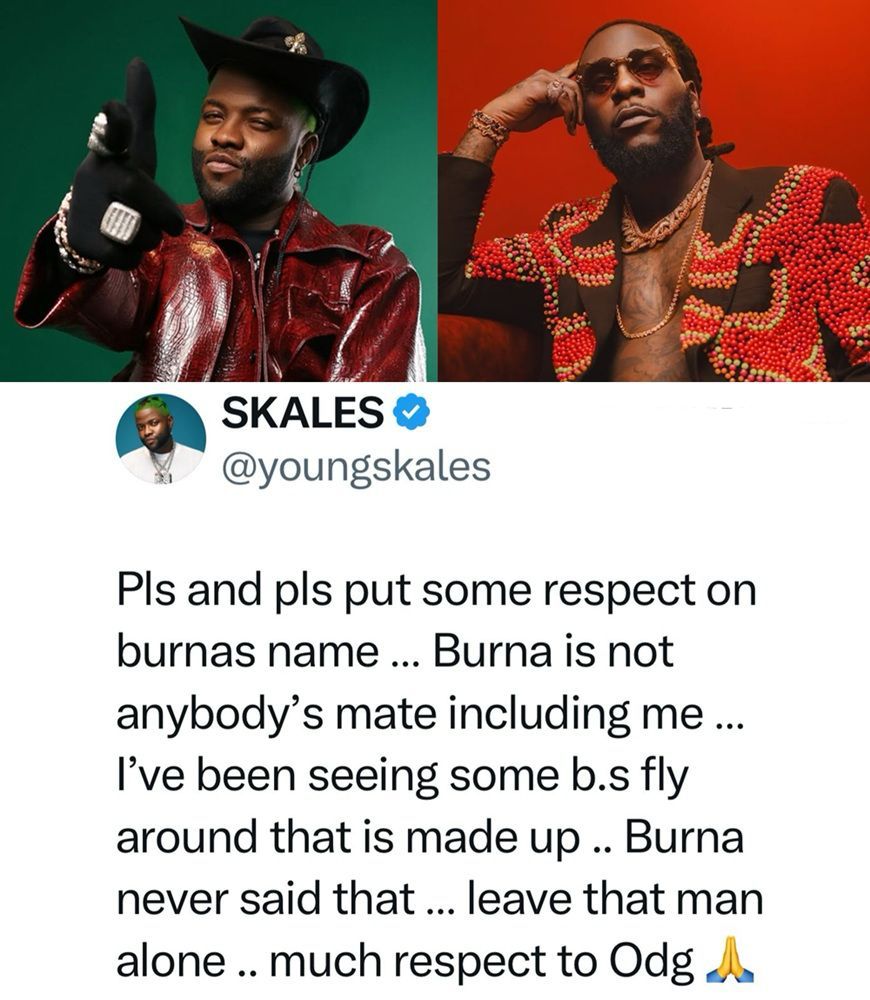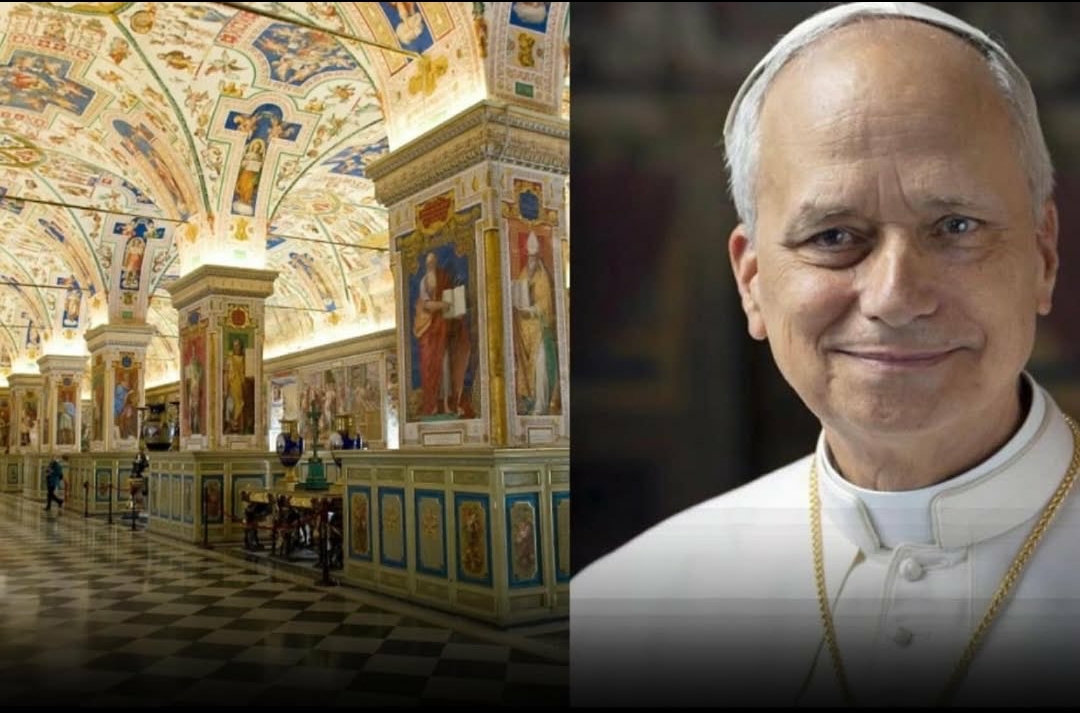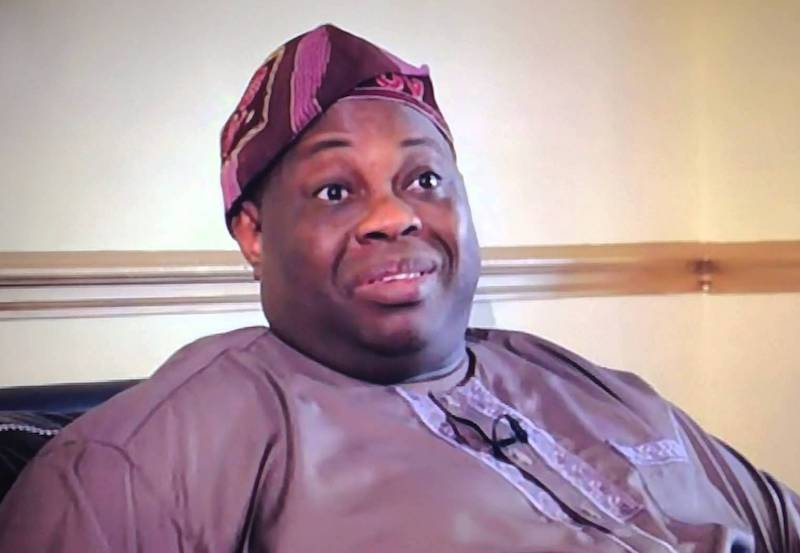
“Burna Is Not Anybody’s Mate—Including Me”: Skales Defends Burna Boy in Bold PSA Against False Claims

Nigerian singer and songwriter Skales has issued a passionate public statement urging critics and fans alike to “put some respect” on the name of Grammy Award-winning artist Burna Boy, following a wave of online misinformation and negative chatter aimed at the Afro-fusion superstar. In a tweet that has since gained widespread attention, Skales made it crystal clear that Burna Boy deserves to be recognized as a heavyweight in the music industry and should not be casually disrespected or dragged into baseless controversies.
“Please and please put some respect on Burna’s name,” Skales wrote on his official Twitter handle. “Burna is not anybody’s mate, including me… I’ve been seeing some b.s fly around that is made up. Burna never said that… leave that man alone. Much respect to Odg.”
The comment comes amid a recent online frenzy involving fake quotes and unverified claims attributed to Burna Boy, which appear to have been strategically circulated to stir up drama and pit him against other artists. But Skales, who has had his own share of ups and downs in the industry and knows first-hand how toxic misinformation can be, wasn’t having any of it. His message was a clear PSA: respect the journey, the hustle, and the accomplishments of Burna Boy, or simply keep his name out of your mouth.
This isn't the first time Burna Boy has been the subject of fabricated rumors or targeted narratives. From the streets of Port Harcourt to winning a Grammy for his album Twice as Tall, Burna Boy’s rise has been anything but ordinary. And while his confident, sometimes defiant personality has earned him both die-hard fans and outspoken critics, one thing that remains undeniable is his place at the top of the global Afrobeats movement. With multiple platinum records, sold-out stadium tours, and collaborations with international legends, Burna Boy is no longer just a Nigerian act—he’s a global icon. And Skales wants everyone to remember that.
The fact that Skales, who has previously had tension with Burna Boy, is now publicly defending him only adds weight to the statement. Observers of the Nigerian music scene will recall their brief spat years ago, which makes this latest show of solidarity even more significant. It’s not just a casual comment; it’s a mature acknowledgment of growth, both personal and professional, and a bold call for unity and mutual respect among artists.
Fans and industry watchers have been quick to react. Many praised Skales for speaking up and setting the record straight, especially in a time when social media can rapidly become a breeding ground for negativity and false narratives. “This is how it should be. No need to drag someone who’s not bothering anybody. Burna has worked too hard to have his name thrown around carelessly,” one Twitter user commented. Another wrote, “Skales is right. Whether you like him or not, Burna Boy has paid his dues.”
Burna Boy, known for hits like “Ye,” “Last Last,” and “City Boys,” has built a reputation not only for his music but also for his unapologetic personality. He has often spoken about how misunderstood he feels in the industry, especially when he’s misquoted or attacked for things he never said or did. This latest round of fake stories only adds to the growing pile of misleading narratives that many believe are targeted attempts to discredit his success or stir conflict where there is none.
What Skales is doing here is bigger than just defending one man. His message cuts to the heart of a broader issue in the music world, especially in Nigeria: the need for more respect, more truth, and less toxicity. The culture of online dragging, fake beefs, and clout-chasing through misinformation has become all too common. Artists are human too. They bleed, they grow, and they evolve. And for someone like Burna Boy, who has carried the flag of African music across continents, the least he deserves is respect.
While Burna Boy himself has not publicly addressed this latest episode of rumors, the silence could very well be intentional—a calculated refusal to give life to drama that thrives on attention. But with allies like Skales stepping up to defend the truth, the message rings even louder.
Skales’s tweet also reflects a shifting culture in the Nigerian entertainment industry, one where maturity, reconciliation, and truth are beginning to take center stage over petty rivalries and manufactured controversies. Fans are increasingly calling out false reports, fact-checking viral quotes, and demanding more accountability from gossip blogs and content creators. It’s a cultural shift that artists like Skales are helping to drive with bold, no-nonsense statements like this one.
At the end of the day, music should be about expression, creativity, and impact—not about who can tear whom down for likes and retweets. Burna Boy’s legacy, much like the music he makes, is one that resonates deeply with millions. From themes of resilience and black pride to love and heartbreak, his art speaks for itself. And now, with voices like Skales stepping up to demand respect for him, perhaps the culture is beginning to shift toward something healthier, something more honest.
Whether you’re a die-hard Burna Boy fan or a casual listener, one thing is clear: he is not your mate. He’s not just another artist in the mix. He is a phenomenon—one that even his peers, like Skales, acknowledge with reverence. So the next time someone tries to drag Burna’s name into some made-up drama, remember the words: put some respect on his name. Because in the world of African music, Burna Boy is in a league of his own.


